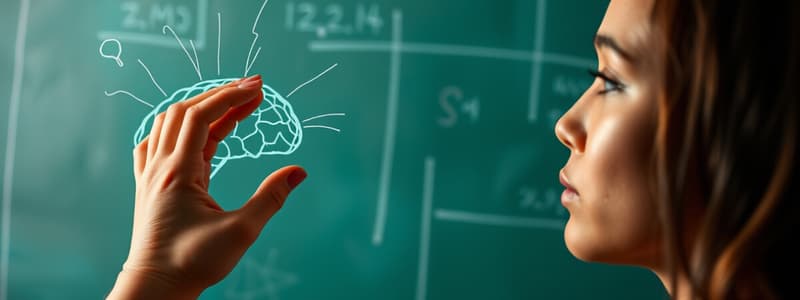Podcast
Questions and Answers
What is the primary focus of Social Cognitive Theory?
What is the primary focus of Social Cognitive Theory?
- The interaction between personal factors, behaviors, and the environment (correct)
- The role of genetics in behavior
- The importance of reinforcement in learning
- The effects of community on individual development
Which of the following concepts is Albert Bandura best known for?
Which of the following concepts is Albert Bandura best known for?
- Social Learning Theory (correct)
- Operant Conditioning
- Classical Conditioning
- Self-Regulation
What concept explains how aggressive behaviors are learned by observing others?
What concept explains how aggressive behaviors are learned by observing others?
- Behavior Modification
- Social Learning Theory (correct)
- Operant Conditioning
- Cognitive Dissonance
Which factor is noted to contribute to depression alongside low self-efficacy?
Which factor is noted to contribute to depression alongside low self-efficacy?
What is the first step in the process of observational learning according to Social Learning Theory?
What is the first step in the process of observational learning according to Social Learning Theory?
What process can maintain fearful behaviors in individuals with phobias?
What process can maintain fearful behaviors in individuals with phobias?
In the Bobo Doll Experiment, what behavior did children imitate?
In the Bobo Doll Experiment, what behavior did children imitate?
In the context of the Bobo Doll Experiment, what type of behaviors were specifically observed being learned?
In the context of the Bobo Doll Experiment, what type of behaviors were specifically observed being learned?
What mechanism allows individuals to learn new behaviors without direct reinforcement?
What mechanism allows individuals to learn new behaviors without direct reinforcement?
What is a common result of observing dysfunctional behaviors in others?
What is a common result of observing dysfunctional behaviors in others?
How does Social Learning Theory define dysfunctional behavior?
How does Social Learning Theory define dysfunctional behavior?
What concept represents an individual's belief in their ability to succeed?
What concept represents an individual's belief in their ability to succeed?
In the context of Bandura's work, what does 'Triadic Reciprocal Causation' refer to?
In the context of Bandura's work, what does 'Triadic Reciprocal Causation' refer to?
What was the age range of children involved in Bandura's experiment?
What was the age range of children involved in Bandura's experiment?
What was the primary focus of the procedure in Bandura's study?
What was the primary focus of the procedure in Bandura's study?
Which learning mechanism emphasizes learning through direct experience and consequences?
Which learning mechanism emphasizes learning through direct experience and consequences?
Which of the following components is NOT part of triadic reciprocal causation?
Which of the following components is NOT part of triadic reciprocal causation?
What role do chance encounters play in shaping an individual's life path?
What role do chance encounters play in shaping an individual's life path?
What is a key characteristic of human agency?
What is a key characteristic of human agency?
Which aspect of human agency involves anticipating future events?
Which aspect of human agency involves anticipating future events?
Among the following, which is directly related to learning through observing the behavior of others?
Among the following, which is directly related to learning through observing the behavior of others?
What outcome is associated with high self-efficacy?
What outcome is associated with high self-efficacy?
Which of the following is NOT a source of self-efficacy?
Which of the following is NOT a source of self-efficacy?
What does proxy agency involve?
What does proxy agency involve?
What is collective efficacy?
What is collective efficacy?
Which effect can low self-efficacy have on mental health?
Which effect can low self-efficacy have on mental health?
What can fearful behaviors be learned through?
What can fearful behaviors be learned through?
How can self-efficacy influence motivation?
How can self-efficacy influence motivation?
What can contribute to the maintenance of phobias?
What can contribute to the maintenance of phobias?
Flashcards are hidden until you start studying
Study Notes
Social Cognitive Theory
- Explains learning through observing others' behaviors, attitudes, and emotions.
- Emphasizes the interaction between personal factors, behaviors, and environmental influences.
Albert Bandura
- Born on December 4, 1925, in Alberta, Canada.
- Renowned psychologist known for Social Learning Theory, self-efficacy, and the Bobo Doll Experiment.
Key Concepts of Bandura's Work
- Social Learning Theory: Learning occurs through observation without direct reinforcement.
- Self-Efficacy: Belief in one's own ability to perform behaviors necessary for desired outcomes.
Learning Mechanisms
- Observational Learning: Individuals learn by watching others, such as children imitating aggressive behavior from adults.
Four Steps of Observational Learning
- Attention: Noticing the behavior.
- Retention: Remembering the behavior.
- Reproduction: Imitating the behavior.
- Motivation: Desire to replicate the behavior.
The Bobo Doll Experiment
- Conducted in 1961, focusing on children's aggression.
- Involved 72 participants aged 3 to 6 from Stanford University Nursery School.
- Children divided into three groups: observed aggression, observed non-aggression, and control group.
- Results showed that children imitated aggressive behavior toward the Bobo doll.
Enactive Learning
- Learning through direct experience where consequences reinforce behavior, like avoiding a hot stove after getting burned.
Triadic Reciprocal Causation
- Describes the continuous interaction between behavior, personal factors (like thoughts and emotions), and environmental influences.
Chance Encounters
- Unexpected events can significantly impact life decisions, such as meeting a potential mentor.
Human Agency
- Refers to the capacity to influence one’s life and actions intentionally.
- Core features include intentionality, forethought, self-reactiveness, and self-reflectiveness.
Self-Efficacy
- High self-efficacy promotes confidence, motivation, and persistence.
- Low self-efficacy may lead to self-doubt, reluctance to engage in challenges.
Sources of Self-Efficacy
- Mastery Experiences: Successes bolster confidence.
- Vicarious Experiences: Learning through observing others.
- Verbal Persuasion: Encouragement from others.
- Emotional and Physiological States: Managing emotions influences beliefs.
Proxy Agency and Collective Efficacy
- Proxy Agency: Relying on others for desired outcomes, such as a supervisor advocating for an employee.
- Collective Efficacy: Shared belief in a group's ability to achieve goals, important in team settings.
Link to Mental Health
- Low self-efficacy and poor self-regulation are associated with depression.
- Phobias can develop through learned behaviors and be sustained by avoidance.
- Aggression can be learned through observation, as demonstrated in the Bobo Doll Experiment.
Studying That Suits You
Use AI to generate personalized quizzes and flashcards to suit your learning preferences.




